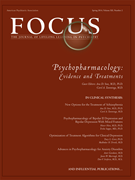Benzodiazepines: Risks and Benefits. A Reconsideration
Abstract
Over the last decade there have been further developments in our knowledge of the risks and benefits of benzodiazepines, and of the risks and benefits of alternatives to benzodiazepines. Representatives drawn from the Psychopharmacology Special Interest Group of the Royal College of Psychiatrists and the British Association for Psychopharmacology together examined these developments, and have provided this joint statement with recommendations for clinical practice. The working group was mindful of widespread concerns about benzodiazepines and related anxiolytic and hypnotic drugs. The group believes that whenever benzodiazepines are prescribed, the potential for dependence or other harmful effects must be considered. However, the group also believes that the risks of dependence associated with long-term use should be balanced against the benefits that in many cases follow from the short or intermittent use of benzodiazepines and the risk of the underlying conditions for which treatment is being provided.
(Reprinted with permission from the Journal of Psychopharmacology 2013; 27(11): 967–971)



